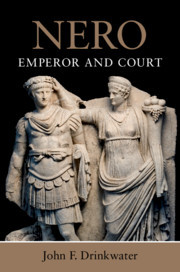Description
Nero
Emperor and Court
Author: Drinkwater John F.
Nero was negligent, not tyrannical. This allowed others to rule, remarkably well, in his name until his negligence became insupportable.
Language: English
Subject for Nero:
Approximative price 27.67 €
In Print (Delivery period: 14 days).
Add to cart
Nero
Publication date: 04-2021
Support: Print on demand
Publication date: 04-2021
Support: Print on demand
Approximative price 45.82 €
In Print (Delivery period: 14 days).
Add to cart
Nero
Publication date: 01-2019
464 p. · 16x23.5 cm · Hardback
Publication date: 01-2019
464 p. · 16x23.5 cm · Hardback
Description
/li>Contents
/li>Biography
/li>
This book portrays Nero, not as the murderous tyrant of tradition, but as a young man ever-more reluctant to fulfil his responsibilities as emperor and ever-more anxious to demonstrate his genuine skills as a sportsman and artist. This reluctance caused him to allow others to rule, and rule surprisingly well, in his name. On its own terms, the Neronian empire was in fact remarkably successful. Nero's senior ministers were many and various, but notably they included a number of powerful women, such as his mother, Agrippina II, and his second and third wives, Poppaea Sabina and Statilia Messalina. Using the most recent archaeological, epigraphic, numismatic and literary research, the book explores issues such as court-politics, banter and free speech; literary, technological and scientific advances; the Fire of 64, 'the persecution of Christians' and Nero's 'Golden House'; and the huge underlying strength, both constitutional and financial, of the Julio-Claudian empire.
Part I. Background: 1. Nero, 'bad' or 'good'?; 2. Agrippina and her legacy; 3. The establishment team; 4. Dissimulation?; 5. Frankness and enquiry; 6. Warfare and the generals; 7. Politics; Part II. Assessment: 8. Killer? I – 54-62; 9. Killer? II – 62-68; 10. Arsonist, persecutor and ruthless urban developer?; 11. Divinity, madness, acting, ideology, burn-out; 12. Depravity? 13. Finance; Part III. End: 14. Entr'acte – Greece; 15. Fall; 16. Conclusion.
John F. Drinkwater is Emeritus Professor of Roman Imperial History at the University of Nottingham. He has been joint editor of the Derbyshire Archaeological Journal and is now also honorary lecturer in Archaeology at the University of Sheffield. He has been elected a Fellow of the Society of Antiquaries of London. His principal field of research is the Roman West and his publications include Roman Gaul (1983); The Gallic Empire (1987); Fifth-Century Gaul (ed., with Hugh Elton, Cambridge, 1992); and The Alamanni and Rome 213–496 (2007).
© 2024 LAVOISIER S.A.S.




